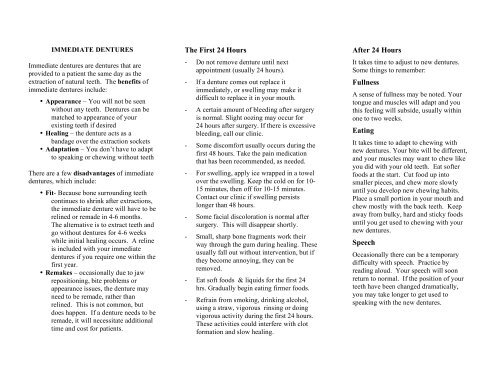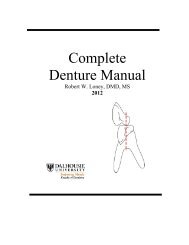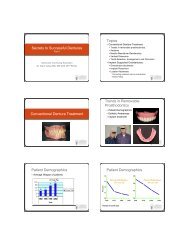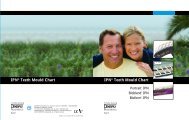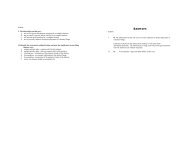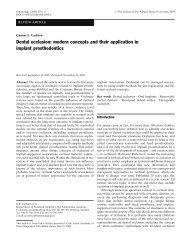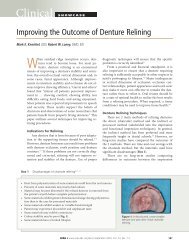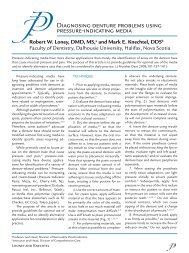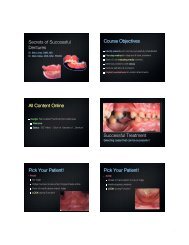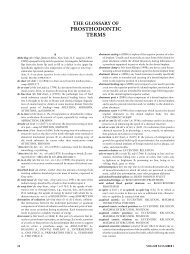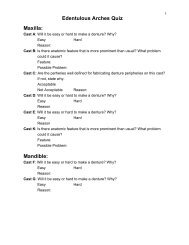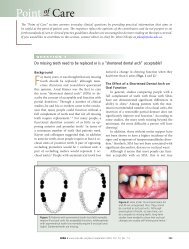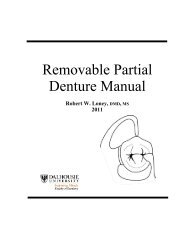Immediate Dentures - Removable Prosthodontics - Dalhousie ...
Immediate Dentures - Removable Prosthodontics - Dalhousie ...
Immediate Dentures - Removable Prosthodontics - Dalhousie ...
Create successful ePaper yourself
Turn your PDF publications into a flip-book with our unique Google optimized e-Paper software.
IMMEDIATE DENTURES<br />
<strong>Immediate</strong> dentures are dentures that are<br />
provided to a patient the same day as the<br />
extraction of natural teeth. The benefits of<br />
immediate dentures include:<br />
• Appearance – You will not be seen<br />
without any teeth. <strong>Dentures</strong> can be<br />
matched to appearance of your<br />
existing teeth if desired<br />
• Healing – the denture acts as a<br />
bandage over the extraction sockets<br />
• Adaptation – You don’t have to adapt<br />
to speaking or chewing without teeth<br />
There are a few disadvantages of immediate<br />
dentures, which include:<br />
• Fit- Because bone surrounding teeth<br />
continues to shrink after extractions,<br />
the immediate denture will have to be<br />
relined or remade in 4-6 months.<br />
The alternative is to extract teeth and<br />
go without dentures for 4-6 weeks<br />
while initial healing occurs. A reline<br />
is included with your immediate<br />
dentures if you require one within the<br />
first year.<br />
• Remakes – occasionally due to jaw<br />
repositioning, bite problems or<br />
appearance issues, the denture may<br />
need to be remade, rather than<br />
relined. This is not common, but<br />
does happen. If a denture needs to be<br />
remade, it will necessitate additional<br />
time and cost for patients.<br />
The First 24 Hours<br />
- Do not remove denture until next<br />
appointment (usually 24 hours).<br />
- If a denture comes out replace it<br />
immediately, or swelling may make it<br />
difficult to replace it in your mouth.<br />
- A certain amount of bleeding after surgery<br />
is normal. Slight oozing may occur for<br />
24 hours after surgery. If there is excessive<br />
bleeding, call our clinic.<br />
- Some discomfort usually occurs during the<br />
first 48 hours. Take the pain medication<br />
that has been recommended, as needed.<br />
- For swelling, apply ice wrapped in a towel<br />
over the swelling. Keep the cold on for 10-<br />
15 minutes, then off for 10-15 minutes.<br />
Contact our clinic if swelling persists<br />
longer than 48 hours.<br />
- Some facial discoloration is normal after<br />
surgery. This will disappear shortly.<br />
- Small, sharp bone fragments work their<br />
way through the gum during healing. These<br />
usually fall out without intervention, but if<br />
they become annoying, they can be<br />
removed.<br />
- Eat soft foods & liquids for the first 24<br />
hrs. Gradually begin eating firmer foods.<br />
- Refrain from smoking, drinking alcohol,<br />
using a straw, vigorous rinsing or doing<br />
vigorous activity during the first 24 hours.<br />
These activities could interfere with clot<br />
formation and slow healing.<br />
After 24 Hours<br />
It takes time to adjust to new dentures.<br />
Some things to remember:<br />
Fullness<br />
A sense of fullness may be noted. Your<br />
tongue and muscles will adapt and you<br />
this feeling will subside, usually within<br />
one to two weeks.<br />
Eating<br />
It takes time to adapt to chewing with<br />
new dentures. Your bite will be different,<br />
and your muscles may want to chew like<br />
you did with your old teeth. Eat softer<br />
foods at the start. Cut food up into<br />
smaller pieces, and chew more slowly<br />
until you develop new chewing habits.<br />
Place a small portion in your mouth and<br />
chew mostly with the back teeth. Keep<br />
away from bulky, hard and sticky foods<br />
until you get used to chewing with your<br />
new dentures.<br />
Speech<br />
Occasionally there can be a temporary<br />
difficulty with speech. Practice by<br />
reading aloud. Your speech will soon<br />
return to normal. If the position of your<br />
teeth have been changed dramatically,<br />
you may take longer to get used to<br />
speaking with the new dentures.
Sore Spots<br />
It is common to have sore spots after you get<br />
new dentures. Gum tissue can be pinched<br />
between the denture and bone, and sores may<br />
develop. These can be adjusted at our clinic.<br />
Sore spots should not persist, unless you have<br />
so little bone to support the denture that it<br />
floats or moves easily in your mouth. Call<br />
for an appointment if sore spots persist.<br />
Rest Your Mouth At Night<br />
Once healing has occurred you should<br />
remove your dentures for at least 8 hours a<br />
day, usually while sleeping. Resting the<br />
tissues improves gum health and allows the<br />
denture to fit better for a longer period of<br />
time.<br />
Place denture in a container with liquid<br />
overnight (see reverse). <strong>Dentures</strong> should not<br />
be left in a dry environment, since they will<br />
dry out and possibly change shape.<br />
Appointments for new dentures, relines or<br />
for adjustments to dentures that have been<br />
made in our clinic can be made at:<br />
Faculty of Dentistry,<br />
<strong>Dalhousie</strong> University<br />
Halifax, NS B3H 3J5<br />
494-2101<br />
Cleaning <strong>Dentures</strong><br />
- Whenever possible clean your denture(s)<br />
after each meal and before sleep. Begin to<br />
do this after the first 24-48 hours, or when<br />
your dentist indicates it is okay to do so.<br />
- Use a soft long bristled brush to clean the<br />
inside and outside surfaces of the denture.<br />
- Use a denture toothpaste or liquid dish<br />
detergent with the toothbrush.<br />
- Brush the denture over a sink full of water,<br />
or over a towel, so if you drop it, it won’t<br />
hit something hard and break.<br />
- Soak the denture overnight in a<br />
commercial denture cleaner of your choice<br />
(e.g. Efferdent, Polident) or soak it in a<br />
dilute solution of bleach (one tablespoon of<br />
household bleach to 8 oz of water). Rinse<br />
well before replacing it in your mouth.<br />
- For best results, use both brushing and<br />
soaking to clean the denture.<br />
- Have your denture checked once a year in<br />
case small adjustments are needed to help<br />
improve the bite, the fit or comfort.<br />
<strong>Immediate</strong><br />
<strong>Dentures</strong><br />
Division of <strong>Removable</strong><br />
<strong>Prosthodontics</strong><br />
Dept of Dental Clinical Sciences<br />
Faculty of Dentistry,<br />
<strong>Dalhousie</strong> University<br />
Halifax, NS B3H 3J5<br />
For appointments for new dentures,<br />
relines or for adjustments to dentures<br />
that have been made in our clinic<br />
Call:<br />
494-2101


